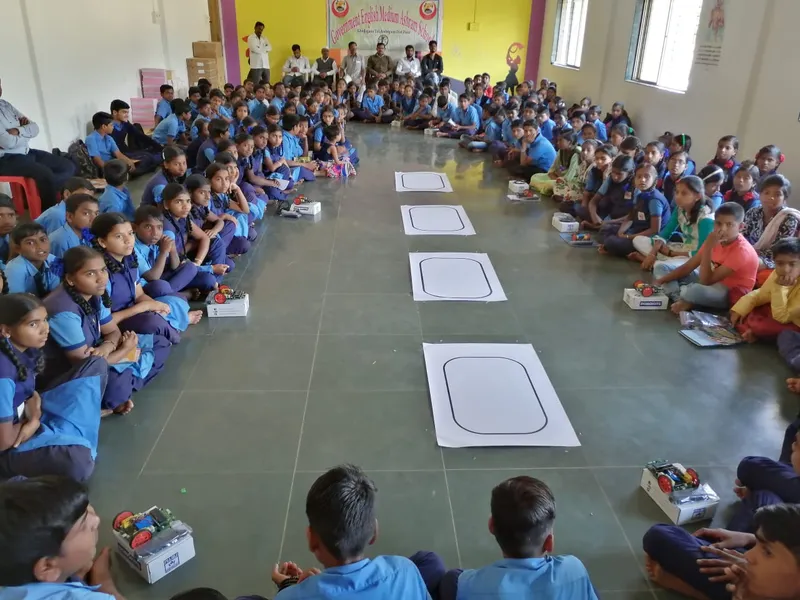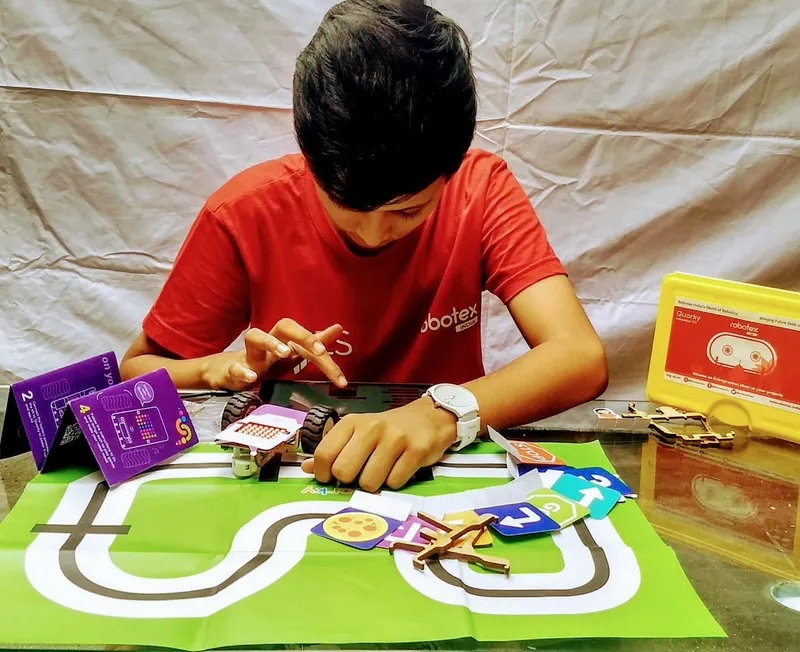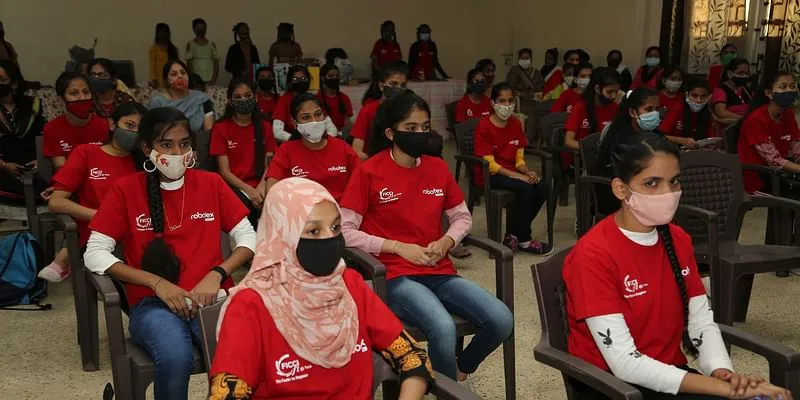How this non-profit is making robotics accessible to rural and underserved children across India
The Robotex India faction was introduced in India in 2018 to make robotics available to the underserved children. Today, it claims to have successfully coached over 20,000 children from government schools.
In the past few years, the role of artificial intelligence (AI) and robotics has been gaining a lot of prominence among the student population across the world.
In this scenario, Robotex International has been giving students a platform to showcase their talents in robotics since 2001.
Robotex India, a non-profit organisation, advancing STEAM, robotics, AI, ML, and IoT to government schools in urban, tribal, and rural areas, was initiated by Payal Rajpal in 2018.

Founder Payal Rajpal
“Earlier, the focus of robotics and coding in India was mainly for college students. Therefore, our aim was to build the ecosystem in the K12 area,” says Payal, the Director of Robotex India and the Founder of Hack the Crisis.
Over the years, the organisation claims to have successfully coached over 20,000 children from government schools across India. These children have been showcasing many innovations, including mini garbage collectors, a talking bot for staying home, and a mini-JCB, among thousands of other innovations.
The workings
The Pune-based organisation launched the first Robotex Championship in 2018, where it witnessed how Indian students were at par with the global robotics community, with projects from over 7,000 students.
However, the participants were predominantly from private schools that had enrolled in private co-curricular external classes on robotics and coding.
But amid that crowd was an eight-year-old boy who walked up to Payal asking if he could present in his local language and not English. The boy had made an agriculture seed sowing bot reducing the farmers time by 25 percent.
After the presentation, when she asked about the robot and the boy’s aspirations, he said his mother works as domestic help and the robot was a hand me down from the owner's son. He then provided the code via YouTube tutorials and made the motor movements of the robot possible.
That’s when Payal decided to start Robotex India for rural, tribal, and government schools. Within a year, she says, thousands of students were trained and some fascinating prototypes created. This activity was conducted in states of Maharashtra and Gujarat.
“As a non-profit, these workshop initiatives gave us remarkable attention from the corporates who were dedicating their CSR towards education. The niche area of ‘future skills’ stuck a cord with many IT and ITES companies and a few started to support us with their CSR funds,” Payal tells SocialStory.
Robotics for rural children
One of the first workshops was in Ghodegaon, Maharashtra, where around 1,000 students from 20 aashramshaala schools came together for over a 10-day long workshop.
They had limited knowledge of computers. However, the passion they exhibited for learning was replicated in all the government schools where we conducted workshops, says Payal.

For the students of Ghodegaon, there was a dearth of phone devices and the internet. The school had an ICT lab where students from 20 ashram shalas came together to one school and were taught in batches as shown in photos over a week.
In the 2019 championship, the number of children increased two-fold as Robotex was launched in six more cities. This year, even the students from rural, tribal, and government schools showcased their work.
“I was teary-eyed to see them remove the robot from the box like a prized possession and meticulously calibrating it near the track before their names were called,” Payal shares.
Going virtual
This year, Robotex India has been allocated to build STEAM and Robotics labs in three government schools in Pune via a CSR sponsor.
“The CEO, zilla parishad, and the education department are extremely driven and supportive making us accomplish our goals speedily,” says Payal.
Robotex India is now conducting workshops for new batches of approximately 11,000 students in four states – Maharashtra, Gujarat, Delhi, and Telangana. The students connect virtually in groups with the help of smartphones. In case smartphones are unavailable, the volunteers have ensured the children can access these videos and sessions after the live classes from the Learning Management System or LMS.

One of the students working on his robot
The 2021 championship will be an online digital competition with themes in the category of environment, agriculture, post-COVID economy innovations, sustainability, education, and science.
The students will display their robotics and coding innovative projects in the following themes. A hackathon model championship will be conducted, and winners of Robotex India will participate at Robotex Asia and Robotex International in October and November, respectively.
The impact
“Since inception, we have successfully coached over 20,000 children from the government schools,” says Manisha Sawant, one of the coordinators of Robotex India.
The Robotex India team has about 50 employees, and about 100 volunteers who come from engineering backgrounds teach the children.
Madhusudhan HJ, one of the volunteers for Robotex, joined the organisation just before the pandemic. He says, “We were able to provide many extra-curricular opportunities except for technology updates for future career needs. The partnership with Robotex India is on the path to bridge the gap, with many students understanding the outline of logic and coding.”

The students at an offline workshop during the pandemic
It has also reached underserved children with the help of volunteers from NGOs like Teach For India.
In terms of funding, even though Robotex has CSR support at present, initially, Payal had utilised her personal funds for the ‘Robotex for Rural’ workshops.
“This year, the support of additional corporates via funds, employee engagement volunteering plus forums that of Ficci Flo and Rotary have helped us mobilise robotics to a larger number of students in government schools,” she shares.
Challenges and the road ahead
Manisha says, “Getting the children to attend classes was a challenge as most of their parents could not give them smartphones during the day. So, we try to conduct classes post 6 pm.”
To save more data, the team ensured the students downloaded the videos rather than stream them live as it utilises more data.
“Moreover, we also had to make sure our classes were interesting in order to hold the attention of the children,” says Ayush Joshi, another coordinator of Robotex India.
“For this, we showed them different robots made by different people, and guided them in fulfilling any ideas that they may have for a robot,” he adds.
Speaking about future plans, Robotex India wants to ensure that learning AI/ML, STEAM and others is accessible to all children in the coming years, without any social or economic factors hindering their potential.
YourStory’s flagship startup-tech and leadership conference will return virtually for its 13th edition on October 25-30, 2021. Sign up for updates on TechSparks or to express your interest in partnerships and speaker opportunities here.
For more on TechSparks 2021, click here.
Applications are now open for Tech30 2021, a list of 30 most promising tech startups from India. Apply or nominate an early-stage startup to become a Tech30 2021 startup here.
Edited by Megha Reddy








